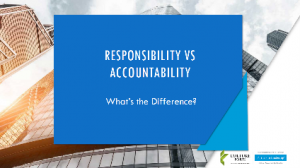
NEWS
News
4-Feb-2023
Responsibility vs. Accountability
Source Article | Accountability Insights from Partners in Leadership | Adapted
 Who is Accountable[/caption]
While the words responsibility and accountability are often used interchangeably, we believe there is an important and fundamental difference between the two—a night and day difference—and that currently adopted definitions for accountability are wrong. We appreciate the definitions and respect the notion of being responsible and the need for it, but we know from decades of experience that accountability is something truly empowering, not something consequential (“subject to; answerable”). When people use these two words synonymously, this misapplication can unintentionally create tendencies to blame, add unnecessary confusion, cause disengagement, and lead to poor performance.
Who is Accountable[/caption]
While the words responsibility and accountability are often used interchangeably, we believe there is an important and fundamental difference between the two—a night and day difference—and that currently adopted definitions for accountability are wrong. We appreciate the definitions and respect the notion of being responsible and the need for it, but we know from decades of experience that accountability is something truly empowering, not something consequential (“subject to; answerable”). When people use these two words synonymously, this misapplication can unintentionally create tendencies to blame, add unnecessary confusion, cause disengagement, and lead to poor performance.
 RESPONSIBILITY VS. ACCOUNTABILITY EBOOK
Read our eBook, Responsibility vs. Accountability, to learn more about the subtle, but crucial, differences between responsibility and accountability.
> Download now
Organizations often try to solve these problems by redefining responsibilities—reorganizing what people do and restructuring the way work is done—only to find that changing where people sit in the organization won’t necessarily change how they think and perform. What they are lacking is personal accountability—involving a choice to move closer to the success that you or your organization wants. When you step up to greater personal accountability, employees stop blaming each other, salespeople stop blaming the marketplace, companies stop blaming their competitors, and we all stop blaming the economy—you get the picture. Finding convenient reasons to shift responsibility or blame is never effective and never brings better results.
RESPONSIBILITY VS. ACCOUNTABILITY EBOOK
Read our eBook, Responsibility vs. Accountability, to learn more about the subtle, but crucial, differences between responsibility and accountability.
> Download now
Organizations often try to solve these problems by redefining responsibilities—reorganizing what people do and restructuring the way work is done—only to find that changing where people sit in the organization won’t necessarily change how they think and perform. What they are lacking is personal accountability—involving a choice to move closer to the success that you or your organization wants. When you step up to greater personal accountability, employees stop blaming each other, salespeople stop blaming the marketplace, companies stop blaming their competitors, and we all stop blaming the economy—you get the picture. Finding convenient reasons to shift responsibility or blame is never effective and never brings better results.
Choose Accountability
When a result isn’t achieved, that’s when most of us start hearing words like “responsibility” and “accountability.” While responsibility is appreciated and often used correctly, accountability continues to be misperceived and gets a bad rap—we’re here to tell you why it shouldn’t.Two Words, Two Meanings
The words responsibility and accountability rear their heads when people start talking about results—especially when the desired results are not achieved. That’s when remarks and phrases like, “Who’s responsible for missing the deadline?!” and “Which department is accountable for not delivering our goals?” begin to get thrown around. Are these words being used correctly? As the pioneers of Accountability Training®, we often get questions around the differences between these two words and how they tie to the achievement of results. In fact, many professionals we work with initially don’t think they have accountability issues but, rather, believe that they have responsibility issues instead. It’s not until we demonstrate the way we address accountability that they begin to see that accountability, not responsibility, plays a major role in overcoming almost every challenge they face. To do this, we first help them understand that the definition of accountability is broken and must be fixed to be truly grasped. Dictionary.com defines each as: Accountable: “subject to the obligation to report, explain, or justify something; responsible; answerable.” Responsible: “answerable or accountable, as for something within one’s power, control, or management.” [caption id="attachment_74661" align="alignleft" width="185"] Who is Accountable[/caption]
While the words responsibility and accountability are often used interchangeably, we believe there is an important and fundamental difference between the two—a night and day difference—and that currently adopted definitions for accountability are wrong. We appreciate the definitions and respect the notion of being responsible and the need for it, but we know from decades of experience that accountability is something truly empowering, not something consequential (“subject to; answerable”). When people use these two words synonymously, this misapplication can unintentionally create tendencies to blame, add unnecessary confusion, cause disengagement, and lead to poor performance.
Who is Accountable[/caption]
While the words responsibility and accountability are often used interchangeably, we believe there is an important and fundamental difference between the two—a night and day difference—and that currently adopted definitions for accountability are wrong. We appreciate the definitions and respect the notion of being responsible and the need for it, but we know from decades of experience that accountability is something truly empowering, not something consequential (“subject to; answerable”). When people use these two words synonymously, this misapplication can unintentionally create tendencies to blame, add unnecessary confusion, cause disengagement, and lead to poor performance.
Is More “Responsibility” Going to Lead to Success?
For instance, a responsible team or organization can be successful in many ways:- Define roles and job descriptions with focus.
- Establish clear organizational hierarchies.
- Have processes and systems in place.
- Have feedback sessions in the form of reviews.
- Even consistently hit their numbers.
- Siloed thinking and acting with reluctant behaviors around getting involved in things outside their control.
- “I thought you had it” mentalities where people ignore and deny one another’s ability to positively contribute.
- Attitudes where people justify the ways they think and act to cover their tails.
- Poor performance and development due to infrequent feedback exchanges.
80%
80% of those surveyed say feedback is something that happens to them only when things go wrong or not at all. RESPONSIBILITY VS. ACCOUNTABILITY EBOOK
Read our eBook, Responsibility vs. Accountability, to learn more about the subtle, but crucial, differences between responsibility and accountability.
> Download now
Organizations often try to solve these problems by redefining responsibilities—reorganizing what people do and restructuring the way work is done—only to find that changing where people sit in the organization won’t necessarily change how they think and perform. What they are lacking is personal accountability—involving a choice to move closer to the success that you or your organization wants. When you step up to greater personal accountability, employees stop blaming each other, salespeople stop blaming the marketplace, companies stop blaming their competitors, and we all stop blaming the economy—you get the picture. Finding convenient reasons to shift responsibility or blame is never effective and never brings better results.
RESPONSIBILITY VS. ACCOUNTABILITY EBOOK
Read our eBook, Responsibility vs. Accountability, to learn more about the subtle, but crucial, differences between responsibility and accountability.
> Download now
Organizations often try to solve these problems by redefining responsibilities—reorganizing what people do and restructuring the way work is done—only to find that changing where people sit in the organization won’t necessarily change how they think and perform. What they are lacking is personal accountability—involving a choice to move closer to the success that you or your organization wants. When you step up to greater personal accountability, employees stop blaming each other, salespeople stop blaming the marketplace, companies stop blaming their competitors, and we all stop blaming the economy—you get the picture. Finding convenient reasons to shift responsibility or blame is never effective and never brings better results.
Accountability: The Secret Sauce of Responsibility
Clearly defining responsibility is certainly essential, but encouraging people to go a step further to get personally involved will secure better results every time. That’s where taking accountability comes into play. The notion of “taking accountability” naturally sounds more significant than “having responsibility”—you’re making the choice to go beyond what you’re responsible for, carrying with it an idea of ownership, involvement, and engagement. Earlier we looked at how a responsible team or organization might function. Now, let’s look at an accountable team or organization. In a workplace culture where this positive and empowering version of accountability is embraced, you’ll find that:- People at all levels take ownership for the strategic results of the organization.
- Balls do not get dropped and projects do not slip through the cracks.
- People think differently about the job that needs to get done.
- People break-down barriers and collaborate to achieve the right results.
Getting Positive Accountability
It’s not hard to see that the prevailing notions of accountability need to be fixed—we need something more positively defined as “a personal choice to rise above one’s circumstances and demonstrate the ownership necessary for achieving desired results.” When you shift mindsets and thought processes this way, you’ll begin to see and feel traction in yourself and in others. Over nearly three decades of working with some of the world’s top organizations and leaders, we’ve observed 16 Accountability Traits that are the essence of “taking accountability” which includes being good at hearing and saying the hard things to see reality, ensuring one’s work is aligned with the key results, collaborating across functional boundaries and building an environment of trust. These 16 traits have proven, over time, as being the mandatory actions that create the process of taking positive accountability. Adopt the right mindset and step up to these traits and you’ll quickly realize that accountability is not assigned, not put upon, not, at times, so exactly defined that it creates silos, finger pointing, and the blame game. It is chosen.Making the Choice
Working on getting good at the 16 Accountability Traits is just that—work. Where do you begin?- Look them over and be honest with yourself on the ones you need to improve.
- Think about what you can do better and where you can help others.
- Then, do them!
News
25-Mar-2019
The 5 Cs: 5 Essential Qualities That Define Great Leadership
Want to be a stronger leader? Build a stronger team on these five principles.

Article | Accountability Insights by | Feb 7, 2019 | Published with permission from Partners in Leadership
Many leaders focus on upward movement within their organization, deciding ways they can ascend the ranks in their company. However, fighting hard to get to the top doesn’t necessarily make for a strong leader. There’s another approach you can take to improve your leadership skills that is more rewarding and far less lonely: surrounding yourself with great people. But how do you find and cultivate strong workers?
According to the 2018 Gallup Employee Engagement report, only 34 percent of people in the U.S. are engaged in their work. Although this number is quite low, you may be surprised to learn that this is the highest percentage in the history of Gallup’s employee engagement reporting. The number of disengaged workers has reached an all-time low of 13 percent. Despite these record-breaking statistics, U.S. employees’ lack of engagement can have disastrous impacts on the success of their organizations. Perhaps these figures are a direct result of poor leadership.
To inspire engagement and effectiveness in their employees, leaders should look within, asking themselves the following questions:
- How clear and communicative are you as a leader?
- What is your leadership style?
- Do you practice what you preach?
- Do you keep the promises you make?
1. Collaborate
It may be satisfying to be able to complete a project on your own. However, those who try to juggle a considerable amount of work by themselves often result in failure. Competent leaders understand the importance of working with a team to complete tasks both large and small. To encourage collaboration among your team, you should be able to delegate. Having work completed by other members of your team doesn’t mean getting items off your own plate. You will likely need to look over the finished product, after all. Instead, collaboration can vastly improve the quality of the product your team is creating. You know what they say: “Two heads are better than one.”2. Communicate
Strong leaders should motivate and instruct the people on their teams. If they are not skilled communicators, they may have trouble getting messages across to their teams. When speaking with your employees or delegating tasks, be sure to give them clear direction. You should always be willing to answer questions that may arise if the employees are having trouble comprehending complex instructions. Make time to meet with your staff to speak with them and check on their progress to ensure success.3. (Be) Candid
Being honest sounds fundamental to being a great leader, yet many people often hold back what they’d really like to say to avoid hurting someone’s feeling. Instead of helping the problem, this can hurt it. When important statements go unsaid, no one on the team can learn from their mistakes. This will cause them to make the same mistakes over and over, not knowing that what they are doing is incorrect. When correcting employees’ mistakes, you need to figure out a way to approach the issue in a constructive – not harsh – way. Approach the critiques as a form of self-improvement, coaching rather than correcting.4. Connected
Effective leaders understand the value of feedback, on both the giving and receiving end. As managers, we likely have information to share with our employees about their individual performances. Provide regular check-ins with employees to measure their success. A quarterly one-on-one isn’t enough to keep your team on track. Meet individually with your staff members consistently to reinforce their hard work, provide feedback on areas in which they can improve and explain both short- and long-term goals for team metrics. It is just as important to encourage your employees to offer you feedback as it is to lend it to them. When your employees are encouraged to express their opinion, they feel that their voices are important and their ideas are valued. When employees feel useful, they are more likely to stay engaged. Make sure to listen to the feedback you receive and follow through with their requests and suggestions. Getting criticism can be difficult, but make sure you stay off the defensive and thank your employee for their honesty.5. Care
Exceptional leaders are empathetic, caring for their staff members, not just the work they do. Employees want to feel valued. Make sure you ask them about their life. What do they enjoy? How is their family doing? Did they find time to relax on their recent vacation? Work isn’t everything, and employees feel a sense of loyalty when their leader cares about them as a person, not just as a workhorse.Invoking Change in Your Organization
Great leaders typically attribute their success to the strong individuals on their teams. Look to the people who work with you and for you. When they respect their leader and feel that their voice is valuable to the organization, they are likely to feel engaged in their work. As leaders, we are only as good as our people. Forging strong relationships with our teams pays off in corporate morale as well as overall performance. Use the five Cs every day and you may notice an improvement in attitudes and results among your team members.EVENTS
Events
2-Jan-2025
Public Corporate Training Workshops in 2025
Below is the schedule for our public corporate training for 2025
Develop yourself and your people through our award-winning workshops, NEWS© Manager Foundations & Leadership Development, Accountability Builder© and Leadership Builder©; enhance teams and collaborate better through Colored Brain™ Communications; improve management capabilities through Coaching Conversation for Managers; support business growth with effective presentations and powerful narratives through Storytelling for Business Growth; increase personal effectiveness at work through Soundwave© Communications for Executive Presence, NEWS© Mission Possible™ for priority management and CliftonStrengths™ BE STRONG.
Notes and Terms and Conditions*:
1. We reserve the right to cancel or postpone the workshop.
2. Minimum class size to run is 12 participants.
3. Workshop registration closes two weeks before workshop date OR when workshop is full, whichever is earlier.
4. Register now or enquire at info@cultureforte.com with the following information: Workshop and Date, Name, Email, Contact Telephone, Organization and Number of Participants (if coordinating for a group).
5. Contact us at info@cultureforte.com for public workshop for large groups above 10 participants.
6. Email us at info@cultureforte.com to request for the workshop description.
7. Upon receipt of your registration, we will be in touch with you on the training and venue.
8. Contact us to enquire about workshop dates for these courses.
9. Virtual Instructor-Led Trainings (vILT) may be conducted virtually over two half-day sessions. This can be opted for intact large groups.
10. Add-on workshops to BE STRONG workshop.
| WORKSHOP* | DAYS | FEE per PAX | VENUE | JAN to MAR 2024 | APR to JUN 2024 | JUL to SEP 2024 | OCT 2025 to JAN 2026 | |
| 1 | SoundWave™ Communications for Executive Presence*79 See Description | 1 day | $865 | SIN | May 30 (Friday) 9AM to 5:30PM | |||
| 2 | Team Building through Colored Brain™ Communications*79 See Description | 1 day | $865 | SIN | August 1 (Friday) 9AM to 5:30PM | November 21 (Friday) 9AM to 5:30PM | ||
| 3 | Business Engagement workshop*8 See Description | 1 day | $865 | SIN | ||||
| 4 | Storytelling for Business Growth*8 See Description | 1 day | $865 | SIN | ||||
| 5 | Coaching Conversations for Managers*79 See Description | 1 day | $865 | May 20 (Tuesday) 9AM to 5:30PM | July 18 (Friday) 9AM to 5:30PM | |||
| 6 | NEWS™Manager Foundations & Leadership Development*79 See Description | 2 days | $2000 | SIN | April 3-4 (Thursday & Friday) 9AM to 5:30PM | October 22-23 (Wednesday & Thursday) 9AM to 5:30PM | ||
| 7 | NEWS™ Advanced Virtual Leadership*8 See Description | 3 half-days | $1380 | SIN | ||||
| 8 | NEWS™ Mission Possible*8 See Description | 1 day | $865 | SIN | January 21 2026 (Wednesday) 9AM to 5:30PM | |||
| 9 | CliftonStrengths™ BE STRONG*79 | 1 day | $600 | SIN | ||||
| 10 | CliftonStrengths™ for TEAMS*8 10 | 3.5 hrs | $350 | SIN | ||||
| 11 | CliftonStrengths™ for MANAGERS*8 10 | 3.5 hrs | $350 | SIN | ||||
| 12 | Oz Principle Accountability Builder© (formerly Self Track©)*8 See Description | 1 day | $1400 | SIN | ||||
| 13 | Leadership Builder™ (formerly Others Track©)*8 See Description | 1 day | $1400 | SIN |
Events
3-Jan-2024
Public Corporate Training Workshops in 2024
Below is the schedule for our public corporate training for 2024.
Develop your people through our award-winning workshops, NEWS® Manager Fundamentals for Leadership, Accountability Builder™ and Leadership Builder™; enhance teams and collaborate better through Colored Brain™ Communications; improve management capabilities through Coaching Conversations for Managers; support business growth with effective presentations and powerful narratives through Storytelling for Business Growth; increase personal effectiveness at work through Soundwave® Communications for Executive Presence, NEWS® Mission Possible™ and CliftonStrengths™ BE STRONG.
Notes and Terms and Conditions*:
1. We reserve the right to cancel or postpone the workshop.
2. Minimum class size to run is 12 participants.
3. Workshop registration closes two weeks before workshop date OR when workshop is full, whichever is earlier.
4. Register now or enquire at info@cultureforte.com with the following information: Workshop and Date, Name, Email, Contact Telephone, Organization and Number of Participants (if coordinating for a group).
5. Contact us at info@cultureforte.com for public workshop for large groups above 10 participants.
6. Email us at info@cultureforte.com to request for the workshop description.
7. Upon receipt of your registration, we will be in touch with you on the training and venue.
8. Contact us to enquire about workshop dates for these courses.
9. Virtual Instructor-Led Trainings (vILT) may be conducted virtually over two half-day sessions. This can be opted for intact large groups.
10. Add-on workshops to BE STRONG workshop.
| WORKSHOP* | DAYS | FEE per PAX | VENUE | JAN to MAR 2024 | APR to JUN 2024 | JUL to SEP 2024 | OCT to DEC 2024 | |
| 1 | SoundWave® Communications for Executive Presence*79 See Description | 1 day | $865 | SIN | March 7 (Thursday) 9AM to 5:30PM | September 9 (Monday) 9AM to 5:30PM | ||
| 2 | Team Building through Colored Brain™ Communications*79 See Description | 1 day | $865 | SIN | January 25 (Thursday) 9AM to 5:30PM | July 17 (Wednesday) 9AM to 5:30PM | ||
| 3 | Business Engagement workshop*8 See Description | 1 day | $865 | SIN | ||||
| 4 | Storytelling for Business Growth*8 See Description | 1 day | $865 | SIN | ||||
| 5 | Coaching Conversations for Managers*79 See Description | 1 day | $865 | SIN | February 6 (Tuesday) 9AM to 5:30PM | August 15 (Thursday) 9AM to 5:30PM | ||
| 6 | NEWS® First-time Managers*79 See Description | 2 days | $2000 | SIN | April 17 & 18 (Wednesday & Thursday) 9AM to 5:30PM | October 23 & 24 (Wednesday & Thursday) 9AM to 5:30PM | ||
| 7 | NEWS® Advanced Virtual Leadership*8 See Description | 3 half-days | $1380 | SIN | ||||
| 8 | NEWS® Mission Possible*8 See Description | 1 day | $865 | SIN | ||||
| 9 | CliftonStrengths® BE STRONG*79 | 1 day | $600 | SIN | April 29 (Monday) 9AM to 5:30PM | November 12 (Tuesday) 9AM to 5:30PM | ||
| 10 | CliftonStrengths®*8 10 for TEAMS | 3.5 hrs | $350 | SIN | ||||
| 11 | CliftonStrengths®*8 10 for MANAGERS | 3.5 hrs | $350 | SIN | ||||
| 12 | Oz Principle Accountability Builder™ (formerly Self Track™)*8 See Description | 1 day | $1400 | SIN | ||||
| 13 | Leadership Builder™ (formerly Others Track™)*8 See Description | 1 day | $1400 | SIN |
Events
23-Jul-2020
Live Online Webinars for Leading During Uncertainty 2020
If you’re looking to gain traction in your business or lead your team through uncertainty, we’re here to listen and provide a fresh way of thinking about how to rise above the challenges you’re facing today. We hope to offer our experience and share some of the models and framework we have been using with our clients for over 30 years and put it in the context of our current global environment.
Our Webinars on Leading During Uncertainty
Increase your Value During Disruption – 8 May 2020, 11am to 11:50am
Managing Culture Remotely – 28 May 2020, 11 am to 11:50am
Upcoming - Choosing Accountability Amidst Disruption – 6 November 2020, 11am to 11:50am
Define and Align Your Culture – 1 December 2020, 11am to 11:50am
Only for Senior Management Webinars
Increase your Value During Disruption with Jaya Dass, MD for Singapore Malaysia, Randstad – 10 June 2020, 11am to 11:50am
Ignite and Navigate Through Disruption for Senior Management – 17 July 2020, 11am to 11:50am
Insights on Ignite and Navigate Through Disruption with Herbert Vongpusanachai, MD, DHL Express Thailand and Head of Indochina – 23 July 2020, 11am to 11:50am
Ignite and Navigate Through Disruption for Senior Management – 17 November 2020, 11am to 11:50am
[button type="small" color="blue" newwindow="yes" link="https://mailchi.mp/cultureforte/live-online-choose-accountability"] Sign up here for our free Live Online webinars for Leading During Uncertainty[/button]
 Our Workshop Appetizers
Mission Possible™ for Being Effective in a Disruptive Reality – 22 October 2020, 2:30pm to 3:30pm
Coaching Ourselves™ for Middle Management – 19 November 2020, 2:30pm to 3:30pm
[button type="small" color="blue" newwindow="yes" link="https://mailchi.mp/cultureforte.com/missionpossible-workshop-appetizer-1"] Sign up HERE for the Workshop Appetizers[/button]
Our ReadItFor.Me Action Classes for lunch-time in South-East Asia
Our Workshop Appetizers
Mission Possible™ for Being Effective in a Disruptive Reality – 22 October 2020, 2:30pm to 3:30pm
Coaching Ourselves™ for Middle Management – 19 November 2020, 2:30pm to 3:30pm
[button type="small" color="blue" newwindow="yes" link="https://mailchi.mp/cultureforte.com/missionpossible-workshop-appetizer-1"] Sign up HERE for the Workshop Appetizers[/button]
Our ReadItFor.Me Action Classes for lunch-time in South-East Asia  Personal Development – Difficult Conversations
Personal Development – Difficult Conversations
 Learn how to have those difficult conversations you need to have with summaries of the best-selling books:
Crucial Conversations by Kerry Patterson - October
Difficult Conversations by Douglas Stone - October
Fierce Conversations by Susan Scott - November
Learn how to have those difficult conversations you need to have with summaries of the best-selling books:
Crucial Conversations by Kerry Patterson - October
Difficult Conversations by Douglas Stone - October
Fierce Conversations by Susan Scott - November
 Leadership – Leading Change
Learn how to create change in your teams and organization with summaries of the best-selling books:
Influencer by Joseph Grenny - October
Switch by Chip and Dan Heath - October
7 Lessons for Leading in a Crisis by Bill George - November
[button type="small" color="blue" newwindow="yes" link="https://mailchi.mp/cultureforte.com/readitforme2020"] MORE on ReadItFor.Me Action Classes and Signing Up[/button]
Our upcoming webinars scheduled for October and November 2020
Leadership – Leading Change
Learn how to create change in your teams and organization with summaries of the best-selling books:
Influencer by Joseph Grenny - October
Switch by Chip and Dan Heath - October
7 Lessons for Leading in a Crisis by Bill George - November
[button type="small" color="blue" newwindow="yes" link="https://mailchi.mp/cultureforte.com/readitforme2020"] MORE on ReadItFor.Me Action Classes and Signing Up[/button]
Our upcoming webinars scheduled for October and November 2020
 Our Workshop Appetizers
Mission Possible™ for Being Effective in a Disruptive Reality – 22 October 2020, 2:30pm to 3:30pm
Coaching Ourselves™ for Middle Management – 19 November 2020, 2:30pm to 3:30pm
[button type="small" color="blue" newwindow="yes" link="https://mailchi.mp/cultureforte.com/missionpossible-workshop-appetizer-1"] Sign up HERE for the Workshop Appetizers[/button]
Our ReadItFor.Me Action Classes for lunch-time in South-East Asia
Our Workshop Appetizers
Mission Possible™ for Being Effective in a Disruptive Reality – 22 October 2020, 2:30pm to 3:30pm
Coaching Ourselves™ for Middle Management – 19 November 2020, 2:30pm to 3:30pm
[button type="small" color="blue" newwindow="yes" link="https://mailchi.mp/cultureforte.com/missionpossible-workshop-appetizer-1"] Sign up HERE for the Workshop Appetizers[/button]
Our ReadItFor.Me Action Classes for lunch-time in South-East Asia  Learn how to have those difficult conversations you need to have with summaries of the best-selling books:
Crucial Conversations by Kerry Patterson - October
Difficult Conversations by Douglas Stone - October
Fierce Conversations by Susan Scott - November
Learn how to have those difficult conversations you need to have with summaries of the best-selling books:
Crucial Conversations by Kerry Patterson - October
Difficult Conversations by Douglas Stone - October
Fierce Conversations by Susan Scott - November
 Leadership – Leading Change
Learn how to create change in your teams and organization with summaries of the best-selling books:
Influencer by Joseph Grenny - October
Switch by Chip and Dan Heath - October
7 Lessons for Leading in a Crisis by Bill George - November
[button type="small" color="blue" newwindow="yes" link="https://mailchi.mp/cultureforte.com/readitforme2020"] MORE on ReadItFor.Me Action Classes and Signing Up[/button]
Our upcoming webinars scheduled for October and November 2020
Leadership – Leading Change
Learn how to create change in your teams and organization with summaries of the best-selling books:
Influencer by Joseph Grenny - October
Switch by Chip and Dan Heath - October
7 Lessons for Leading in a Crisis by Bill George - November
[button type="small" color="blue" newwindow="yes" link="https://mailchi.mp/cultureforte.com/readitforme2020"] MORE on ReadItFor.Me Action Classes and Signing Up[/button]
Our upcoming webinars scheduled for October and November 2020
| Date | Time | Webinar | Category | Theme |
| Thursday, 22 October | 2:30pm to 3:30pm | Mission Possible™ for Being Effective in a Disruptive Reality | Workshop Appetizers | Leadership – Personal and People Development |
| Friday, 6 November | 11am to 11:50am | Choosing Accountability Amidst Disruption | Leading During Uncertainty Webinars | Leadership – Accountability and Culture |
| Tuesday, 17 November | 11am to 11:50am | Ignite and Navigate Through Disruption for Senior Management | Leading During Uncertainty Webinars | Leadership – Strategy and Organizational Development |
| Thursday, 19 November | 2:30pm to 3:30pm | Coaching Ourselves® - Silos and Slabs for MM and SM | Workshop Appetizers | Leadership – Personal and People Development |
| Tuesday, 1 December | 11am to 11:50am | Define and Align Your Culture | Leading During Uncertainty Webinars | Leadership – Accountability and Culture |
| ReadItFor.Me ACTION Classes | ||||
| Thursday, 22 October | 12:30pm to 1:30pm | Crucial Conversations by Kerry Patterson | ReadItFor.Me Action Classes | Personal Development – Difficult Conversations |
| Thursday, 29 October | 12:30pm to 1:30pm | Difficult Conversations by Douglas Stone | ReadItFor.Me Action Classes | Personal Development – Difficult Conversations |
| Tuesday, 27 October | 12:30pm to 1:30pm | Influencer by Joseph Grenny | ReadItFor.Me Action Classes | Leadership – Leading Change |
| Friday, 30 October | 12:30pm to 1:30pm | Switch by Chip and Dan Heath | ReadItFor.Me Action Classes | Leadership – Leading Change |
| November | Fierce Conversations by Susan Scott | ReadItFor.Me Action Classes | Personal Development – Difficult Conversations | |
| November | 7 Lessons for Leading in a Crisis by Bill George | ReadItFor.Me Action Classes | Leadership – Leading Change |








